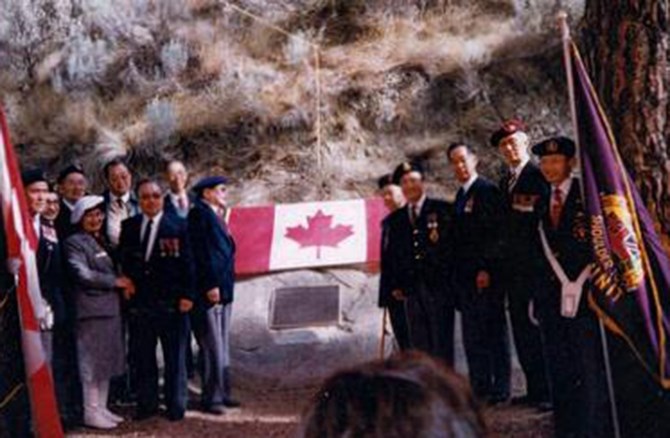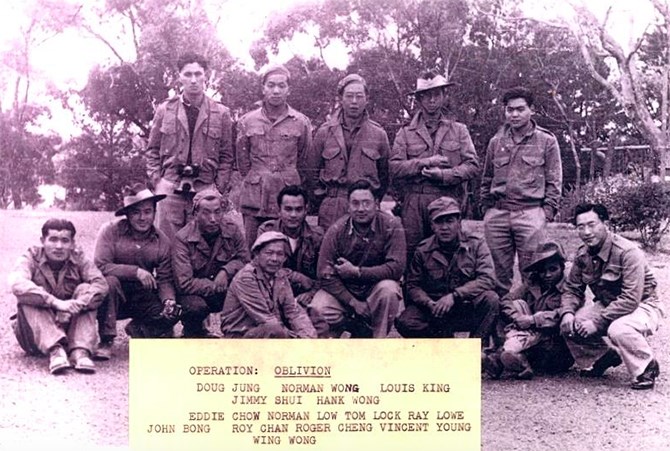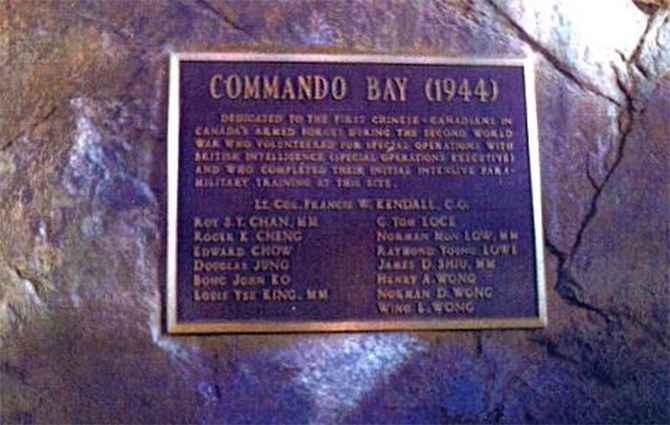
A ceremony was held at Commando Bay on Okanagan Lake north of Naramata on Sept. 17, 1988 to mark the area as a historic site and commemorate the 13 Chinese Canadian soldiers who trained there.
Image Credit: SUBMITTED / Rick Wong
November 09, 2019 - 6:00 AM
The efforts of a small group of Chinese-Canadian soldiers who took part in a British special forces espionage operation during the latter stages of World War II are recognized today by a small plaque situated in what might seem to be an unusual place.
Thirteen Chinese Canadians took part in "Operation Oblivion". Their exploits were a military secret for 25 years after the war, but since then, the story of what these men accomplished both in war and in peace is becoming a more familiar part of Canadian military and social history.
Part of their training included a four-month stint at Commando Bay, a tiny inlet between Naramata and Squally Point on Okanagan Lake, where a memorial plaque, erected in 1988, dedicates the historic site and pays homage to the team.
The men of "Operation Oblivion" included Doug Jung, Norman Wong, Louis King, Jimmy Brui, Hank Wong, Eddie Chow, Norman Low, Tom Lock, Ray Lowe, John Bong, Ray Chan, Roger Cheng, Vincent Young and Wing Wong.
Hank Wong, the last surviving member of the commando team, died on Oct. 10 this year.

The men of "Operation Oblivion."
Image Credit: SUBMITTED / Rick Wong
The men were recruited to fight the Japanese, trained to parachute behind enemy lines in the Pacific war theatre and conduct espionage and sabotage operations during the late stages of World War II.
At a time when Chinese Canadians still had few rights as citizens, the commandos volunteered for the suicide mission in an effort to prove their allegiance and worth as Canadian citizens.
Following their Okanagan training, the men were shipped to Australia where they were taught parachuting. The war suddenly ended after the United States dropped two atomic bombs, one on Hiroshima and the other on Nagasaki, in August, 1945.
Five of the men did see action after being parachuted behind enemy lines in northern Borneo, where they are credited with helping to chase the Japanese army out of the interior of that country.
Those men included Capt. Roger Cheng, who led the group. He recommended war medals for the four men for their actions in Borneo, but never received a medal himself.
The remaining members of the unit were left stranded by wartime logistics in Australia, some of the men working their way back to Canada on tramp steamers.
The Chinese Canadian soldiers of Commando Bay were part of a larger group of between 400 and 600 Chinese Canadian soldiers recruited for similar work. Much of the work was classified; in the case of the Commando Bay unit, there is little official record of their existence, making military details of their accomplishments scarce.
The commandos' war effort had a further reaching effect on the Canadian social fabric. Their professionalism as soldiers made military brass take notice, and the unit’s commanding officer began advocating on behalf of the Chinese Canadian soldiers.
One of the commandos, Doug Jung, became the first Chinese Canadian Member of Parllament, serving Vancouver Centre. He and other commandos spearheaded a group to lobby for Chinese rights.
Shortly after the war, the Chinese were given the right to vote.
Ten of the 13 commandos who trained at Commando Bay attended the Sept. 17, 1988 dedication ceremony for the commemorative plaque. The World War II vets attending the ceremony in 1988 were by then businessmen, a pharmacist, an aeronautical engineer and a lawyer.
Brian Mulroney, then Prime Minister of Canada sent a letter in which he said:
"Not only did this gallant band of Chinese Canadians volunteer for wartime service, they did so knowing that they would be signing up for some extremely dangerous and hazardous missions.
That was courage and commitment beyond the call of duty. Canada was fortunate to have such selfless men.
The listed names on the plaque being unveiled today is truly a roll call of honour. Their contribution in war inspired overdue recognition for every Chinese Canadian in peacetime. Such a legacy will never lose its value."
Ten Chinese veterans from other special duties operations were also part of the service, which was also attended by local political dignitaries and the consul general of the Republic of China.

The plaque at Commando Bay reads:"Dedicated to the first Chinese Canadians in the Canadian Armed Forces during the second world war who volunteered for special operations with British Intelligence special operations executives and who completed their initial paramilitary training at this site."
Image Credit: SUBMITTED / Rick Wong
— This story was updated at 11:27 a.m. Tuesday, Nov. 12, 2019, to include information regarding the commandos dispatched to Borneo provided by surviving relatives of the commandos.
To contact a reporter for this story, email Steve Arstad or call 250-488-3065 or email the editor. You can also submit photos, videos or news tips to tips@infonews.ca and be entered to win a monthly prize draw.
We welcome your comments and opinions on our stories but play nice. We won't censor or delete comments unless they contain off-topic statements or links, unnecessary vulgarity, false facts, spam or obviously fake profiles. If you have any concerns about what you see in comments, email the editor in the link above.
News from © iNFOnews, 2019